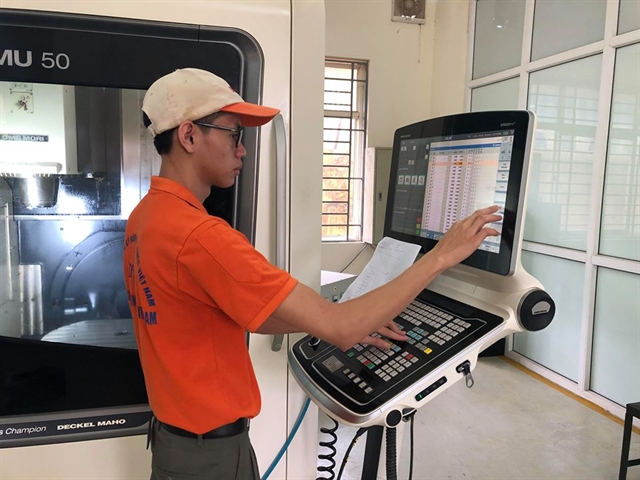 Society
Society

Enrolling in a vocational school was an easy decision for 23-year-old Trương Thế Diệu, even though he was under pressure to become an engineer.

|
| Trương Thế Diệu works with a monitoring machine during a practising session at Hà Nội Vocational College of Technology. — VNA/VNS Photo |
HÀ NỘI — Enrolling in a vocational school was an easy decision for 23-year-old Trương Thế Diệu, even though he was under pressure to become an engineer.
Born and raised in Nghệ An Province’s Quỳnh Lưu District – one of Việt Nam’s poorest localities and home of the country’s most famous intellectuals, Diệu was told that getting into university would be a life-changer.
Graduating high school in 2015, instead of taking the university exam, Diệu registered at the Hà Nội Vocational College of Technology.
“I was planning to follow a technical career and knowing it would be difficult to make my way to a good university, I decided to take another route,” said Diệu.
“Going to a vocational school, all I wanted at the time was to be able to easily find a job that suited my passion and skills,” he added.
Diệu said his studies at high school had given him a special interest in graphics and 3D objects.
“I searched for jobs in the field. The labour market’s current demands and vocational schools have a good reputation, so I decided to choose a training programme on metal work,” he said.
At the Hà Nội Vocational College of Technology, Diệu got his first opportunity in 2016 when Denso, a Japanese company, collaborated with the school to select participants for the 2019 World Vocational Skills Competition.
Overcoming more than 100 candidates in three rounds of quick maths problem solving, IQ and theory tests, Diệu was named among the top ten.
After several other rounds, he became Việt Nam’s only representative at the largest global vocational contest, and decided to defer his studies to pour his heart and soul into the competition.
“The company set very high demands for the candidate in terms of visual thinking, adapting to situations and foreign languages during our two years of training at the Denso Skills Training Institute,” said Diệu.
He spent up to 10 hours a day, six days a week training at the institute before debuting at the 2019 World Vocational Skills Competition in Russia.
Facing competitors from 34 countries and territories, Diệu pocketed a silver medal for CNC (computerised numerically controlled) milling.
“I was surprised and proud,” Diệu said. “It required participants to create very small details which I was not so familiar with. However, the skills I had sharpened helped me to complete the task on time and the final product satisfied the requirements.”
“The medal unlocked my future,” he added.
Diệu was featured in Việt Nam’s top 10 significant youngsters in 2019 and was awarded the second-class Labour Order by Prime Minister Nguyễn Xuân Phúc.
Poor facilities and the lack of domestic professional competitions are the main reasons Vietnamese technical workers still lagged behind their fellows from other countries, according to Diệu. Meanwhile, their diligence, creativity and intelligence needed unleashing.
“Coming back from the competition, I will finish my studies then start focusing on training in CNC milling for Vietnamese participants at the next world vocational skills competitions,” he said.
“Enrolling in vocational schools no longer means elbow grease,” he said.
“The increasing application of innovations requires workers to pay attention to catching up with emerging waves of new technology,” Diệu added. — VNS




